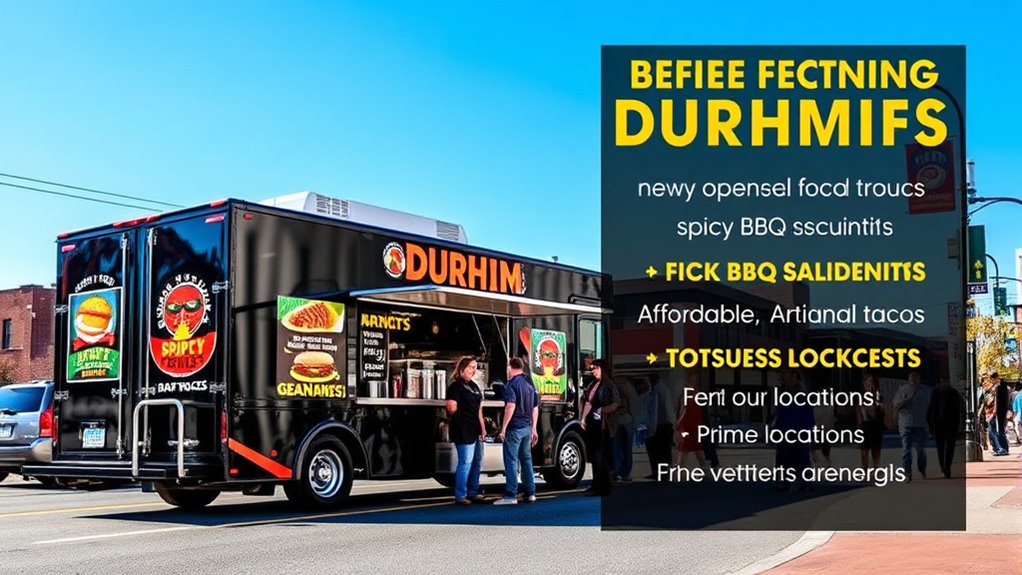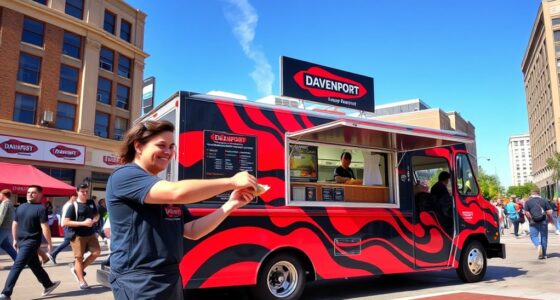To open a food truck in Durham, NC, you’ll need permits like a Food Truck Vendor Permit (~$150), a street vendor registration, and possibly a Wake County vending permit. You can operate on private property or public right-of-way within zoning rules. Develop a compliant menu with quick, appealing options and market your truck through social media and local events. Ensuring ongoing permits and regulations are met is key—continue exploring for more detailed steps.
Key Takeaways
- Obtain necessary permits including a Durham Food Truck Permit (~$150), street vendor registration, and health inspection certificates.
- Operate on private property or public right-of-way within commercial zones, adhering to setback and zoning restrictions.
- Develop a manageable menu with prepackaged items, using shared kitchens, and label ingredients for compliance.
- Utilize social media, community events, and promotions to boost visibility and customer engagement.
- Renew permits annually, submit health inspections, operating schedules, and maintain all documentation to ensure ongoing compliance.
Navigating Permit Requirements and Cost Considerations
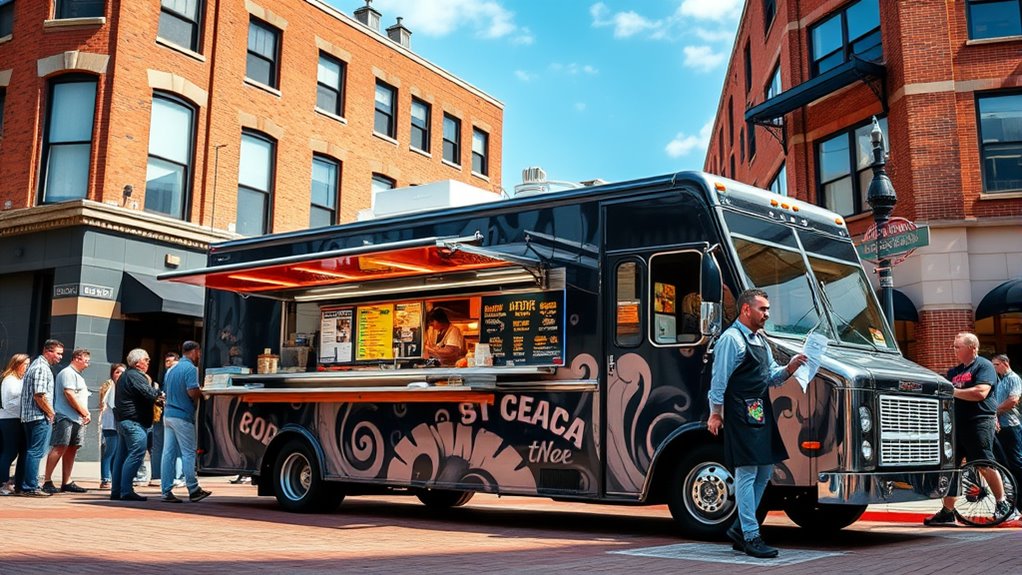
To successfully launch your food truck in Durham, you’ll need to navigate a range of permit requirements and understand the associated costs. First, you’ll need a Food Truck Vendor Permit to operate on private property, which involves applying through local planning departments. If you plan to vend in public spaces, you’ll require a Durham Street Vendor Registration, including an Employer Identification Number (EIN) and health inspection certificate. Costs vary: expect around $150 for the vendor permit, about $26 annually for the Wake County Vending Permit, and similar fees for Home Occupation Permits if parking at a residence. Additional expenses may include business verification letters (~$15.60), inspection fees, and special event permits. Gathering all necessary documents, such as vehicle registration and health certificates, is crucial to ensure compliance and smooth operation. Incorporating regulatory compliance strategies from the private equity sector can help streamline your permit process and mitigate risks.
Identifying Operating Zones and Zoning Regulations
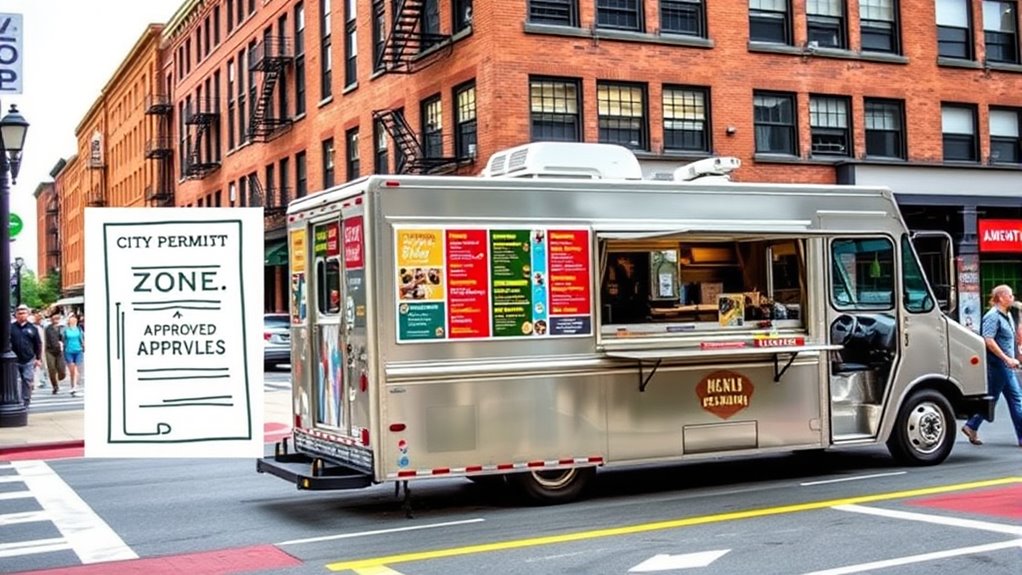
Understanding Durham’s zoning districts is essential for determining where you can operate your food truck. You can operate on private property and public right-of-way within commercial and design districts, but outside these zones, you’ll need special permission like a Special Event Permit. Durham requires shared-use kitchens for food prep, prohibiting domestic residences. For public right-of-way operations, a Streetside Vending permit is necessary. Keep clear of certain restrictions: stay at least 50 feet from restaurant entrances when open, 20 feet from bank entrances, and within 10 feet of intersections, crosswalks, and emergency facilities. You’ll need two permits for private property: one for vendors, one for property owners, plus an additional Streetside Vending permit if serving from the street. Site plans are usually required for permit approval. Additionally, Durham’s zoning regulations specify that trucks must operate within designated districts to ensure proper zoning compliance. It’s also important to understand how zoning regulations influence the types of food trucks permitted in specific areas.
Crafting a Compliant and Appealing Menu
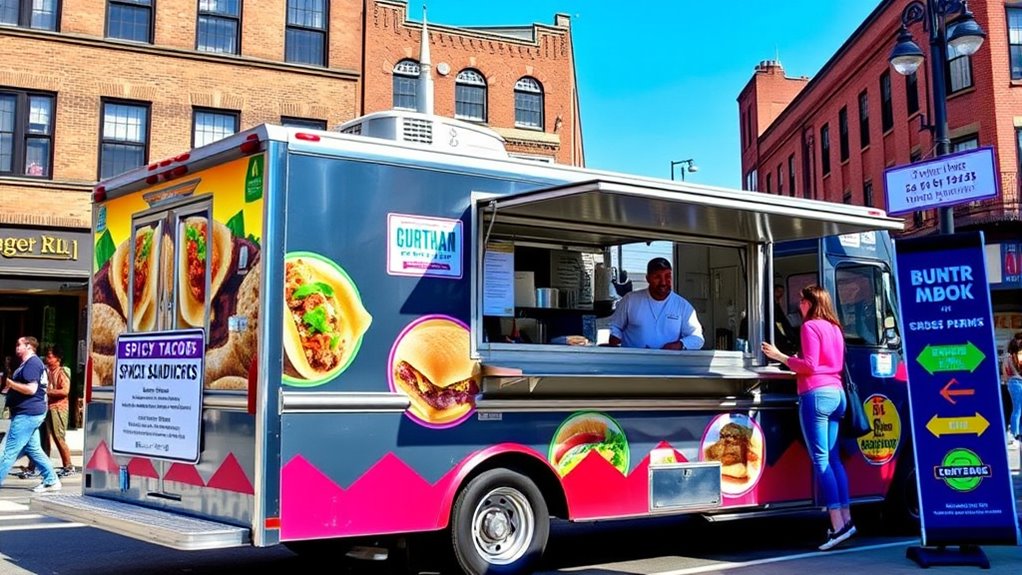
Creating a menu that is both compliant with Durham and North Carolina food regulations and appealing to your customers requires careful planning. Focus on offering items manageable within your truck’s space and safety standards. Use shared kitchens approved by the health department for prep to ensure conformity. Include prepackaged foods from permitted sources and avoid onsite modifications, which could jeopardize permits. Balance menu variety with quick service, featuring local favorites and dietary options like vegetarian or gluten-free. Clearly label ingredients and allergens to meet transparency standards. Additionally, implementing space-efficient menu options can optimize your limited truck area and streamline service.
Effective Marketing Strategies to Grow Your Business
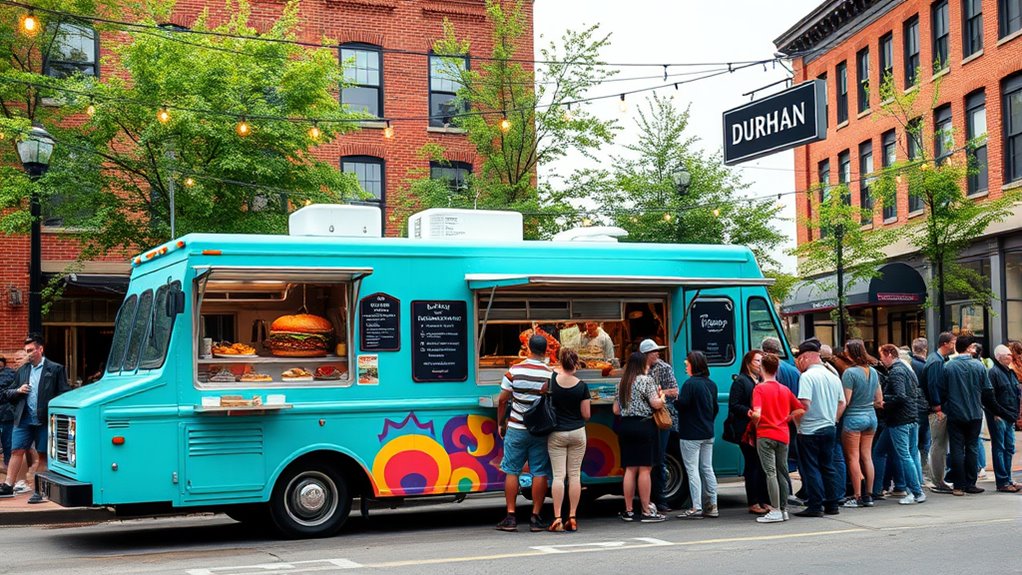
Effective marketing is essential for making your food truck stand out in Durham’s competitive scene. Leveraging social media platforms, especially Facebook, helps you reach a broad audience—68% of food trucks promote regularly, boosting visibility and sales by 20%. Engaging customers through targeted campaigns and local events attracts new patrons and builds brand loyalty. Participating in festivals and community events not only increases foot traffic but connects you with millennials and Gen Z, key demographics. Implementing loyalty programs and utilizing digital tools like email marketing and data analytics enhances customer retention, leading to a 30% rise in repeat visits and a 25% higher marketing ROI. Use attractive visuals, relevant hashtags, and community-focused messaging to resonate with your audience and grow your Durham food truck business. Additionally, incorporating seasonal and holiday-themed promotions can lead to a 25% increase in customer visits, making your marketing efforts even more effective. Moreover, understanding the high-quality ingredients for your menu can differentiate your offerings and attract loyal customers.
Ensuring Ongoing Compliance and Renewal Procedures
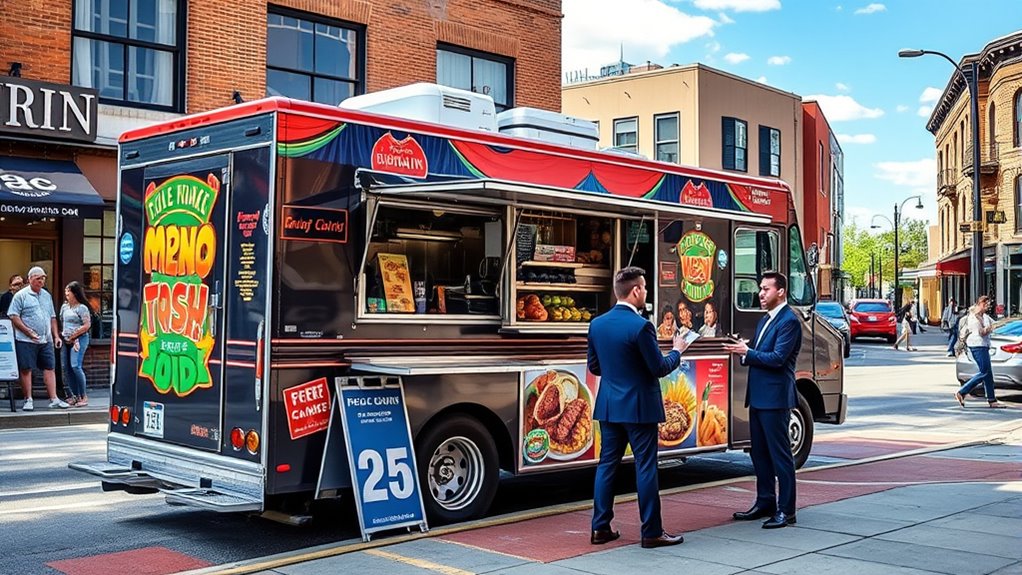
To keep your Durham food truck operating smoothly, you must stay on top of ongoing compliance and renewal procedures. Each year, starting July 1, you need to renew your permits, including street vendor registration and mobile food unit permits. This requires submitting your current Health Inspection Certificate and paying about $101 in fees. You also must adhere to Durham’s zoning rules, ensuring your truck is parked legally and maintains proper setbacks. Monthly, you’ll submit your operating schedule and maintain a Shared Use Kitchen Agreement, confirming your food prep and cleaning locations. All documentation—health certificates, insurance, permits—must be up to date. Payments are made online, and late or incomplete renewals can suspend your license or incur fines. Staying compliant guarantees your food truck remains legally operational year-round. Regularly reviewing local regulations can help you stay informed about any changes to permit requirements or safety standards.
Frequently Asked Questions
Can I Operate a Food Truck on Residential Streets in Durham?
You can’t generally operate a food truck on residential streets in Durham without specific permits. You need a Street Vendor Registration and possibly a Temporary Use Permit if you’re on a residential street for more than four hours or with multiple trucks. Operating on private property requires zoning permits. Make certain you follow city rules, maintain pedestrian access, and avoid setting up tents or seating to stay compliant.
What Insurance Coverage Is Required for Food Truck Operations?
You need to have essential insurance coverage to operate your food truck legally and safely. This includes general liability insurance to cover accidents or injuries, commercial auto insurance for your vehicle, and workers’ compensation if you have employees. Many permits also require proof of insurance with specific limits, like $100,000 per person for bodily injury. Additionally, consider coverage for equipment breakdown or food contamination to protect against unexpected risks.
Are There Any Specific Health Standards for Menu Items in Durham?
Think of your menu like a ship sailing through safety waters—you need to follow the compass of Durham’s health standards. You must craft your offerings according to the North Carolina Food Code Manual, ensuring proper sanitation, temperature control, and preventing cross-contamination. Regular inspections act as your lighthouse, guiding you to stay compliant. Keep your food safe and your reputation afloat by meeting these strict but essential health standards for every item you serve.
How Early Should I Apply for Permits Before Launching?
You should start applying for permits at least 2 to 3 months before your planned launch. This gives you enough time to handle the review process, complete inspections, and gather necessary certificates. Begin health inspections and insurance early, about a month before, to guarantee compliance. Planning ahead helps you avoid delays and ensures everything’s in place when you’re ready to open your food truck.
Can I Sell Alcohol or Beverages From My Food Truck?
You can sell alcohol or beverages from your food truck in Durham, but you’ll need the right permits first. Obtain an ABC permit, which takes about 3-4 weeks, and register your truck with Durham City. Keep in mind, you can only sell in approved commercial zones and during authorized events. Make sure you follow all local laws, including age verification and advertising rules, to sell alcohol legally and avoid penalties.
Conclusion
Starting your food truck in Durham blends opportunity with responsibility. While the permits and costs set the foundation, your innovative menu and marketing create the vibrancy that attracts customers. Balancing compliance with creativity ensures long-term success. In this dance between regulation and passion, it’s your dedication that transforms a simple truck into a beloved local staple. Embrace both aspects—because thriving means maneuvering rules, but flourishing means making your mark.
